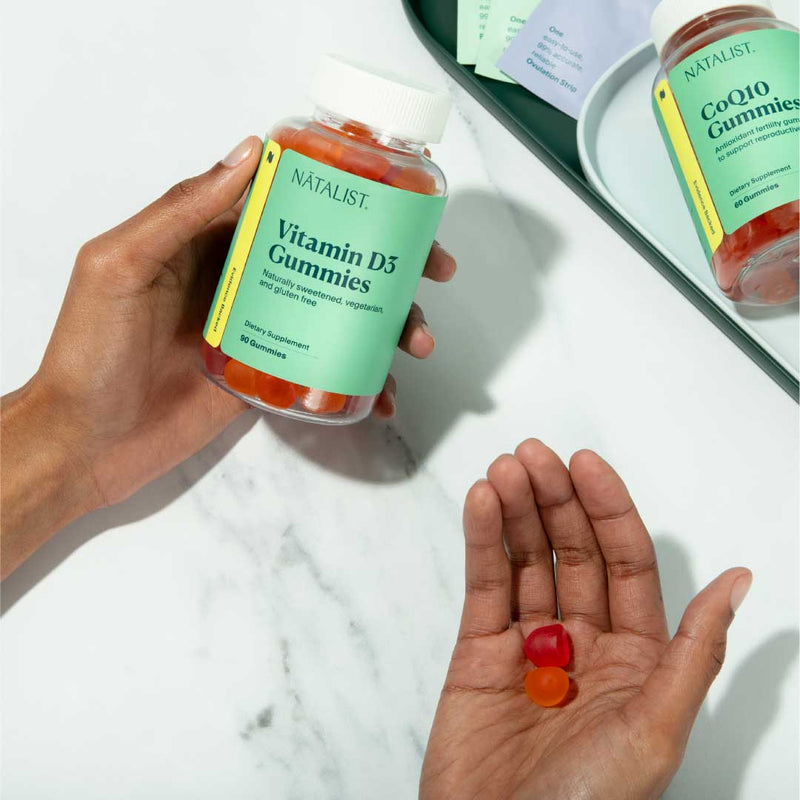Can a Magnesium Deficiency Impact Fertility?

Optimize your chances of fertility. Read on to learn about one supplement that can help.
By OBGYN and fertility expert Dr. Kenosha Gleaton
Vitamins and minerals are essential for our health, especially when it comes to fertility. Most of us are used to hearing about how different vitamins impact our health, but minerals are often left out of the conversation. Let’s start by looking at the fourth most abundant mineral in the body—magnesium.
What Is Magnesium?
Magnesium (Mg) is a mineral that is necessary for a healthy, functioning body. It’s found in many foods including nuts, seeds, grains, greens, and beans. Magnesium is important for maintaining a normal blood pressure, protein synthesis, muscle and nerve function, and much more. It is also required for energy production and plays a role in the structural development of bone and DNA synthesis. Research also shows that magnesium may be beneficial for fertility and pregnancy.
Signs of Magnesium Deficiency
Around 56-68% of Americans are magnesium deficient. Common signs of magnesium deficiency include:
- Loss of appetite
- Nausea
- Vomiting
- Fatigue
- Weakness
As magnesium deficiency worsens, it’s possible that more severe symptoms such as numbness, tingling, muscle cramps, seizures, abnormal heart rhythms, and coronary spasms may occur.
It’s uncommon for otherwise healthy individuals to experience symptomatic magnesium deficiency as the kidneys typically limit magnesium excretion. However, there are some health conditions and lifestyle factors that may cause excessive magnesium loss. Some of the most common reasons for magnesium deficiency include:
- Vitamin D deficiency leads to reduced absorption of magnesium (this is common in western cultures)
- Magnesium absorption is also reduced due to medications such as antibiotics, antacids, and hypertensive drugs
- Alcohol and type 1 and type 2 diabetes lead to excess Mg excretion
- Plasma magnesium levels are reducing by smoking cigarettes
- Magnesium absorption decreased with advancing age
High risk groups for magnesium deficiency include:
- Individuals with gastrointestinal diseases
- Individuals with type 2 diabetes
- Individuals with alcohol dependence
- Older adults
Magnesium’s Health Benefits
Magnesium is essential for everyday bodily function, including regular cellular and organ function, and is involved in over 300 enzyme systems in the body. With these small reactions in the body come many observable benefits to our health, including:
- Treating migraine headaches
- Higher bone mineral density in elderly white men and women
- Smoking cessation
- While data is conflicting, some research shows positive effects on muscle cramps
- Taking magnesium during pregnancy has shown increased pregnancy outcomes
- Positive effects on sleep and relaxation
- Some research shows a correlation between magnesium intake and decreased risk for colorectal cancer
- Increased cardiovascular health, including arrhythmias, hypertension, and more
- Reduction in PMS symptoms including hot flashes, irritability, and pain
- Eye health, including a reduced risk for glaucoma and potential therapeutic benefits for cataracts
- Enhanced skin hydration and barrier repair, as well as treatment for dermatitis.

How Does Magnesium Deficiency Affect Fertility?
Magnesium deficiency has been associated with issues such as chronic hypertension, placental dysfunction, preeclampsia, and premature labor. Early signs of magnesium deficiency are also very similar to those of early pregnancy, including fatigue, nausea, and vomiting. If symptoms are attributed to pregnancy and progress further, low levels of magnesium may worsen and more severe symptoms such as numbness, tingling, muscle contractions, and more may occur.
Decreased overall health alone may lower your risk of conceiving, but the direct link between magnesium and infertility still needs to be further investigated. We do know that magnesium supplementation has been shown to increase pregnancy outcomes, including a reduced risk of preeclampsia, preterm birth, and low birth weight, as well as decreased mean arterial pressure. One study also suggests that magnesium is vital for spermatogenesis (the production of sperm) and sperm motility. Therefore low magnesium levels may negatively affect pregnancy outcomes as well as sperm health and production. Lastly, magnesium deficiency is linked with chronic inflammatory stress, which can negatively impact hormone and ovulation production. Inflammation may also be associated with oxidative stress, which can be damaging to sperm and eggs. Learn more about oxidative stress, antioxidants, and fertility.
How to Prevent Magnesium Deficiency
To ensure you have adequate magnesium levels, make sure you’re eating a balanced diet full of magnesium rich foods. Examples include green leafy vegetables, legumes, seeds, nuts, and whole grains. Often, foods that are high in fiber are also a good source of magnesium. Some fortified foods such as breakfast cereals may have added Mg as well. Some laxatives and antacids may also contain magnesium.
Tap and mineral waters can also be great sources of magnesium and other minerals. The concentration will vary, so be sure to read the label on any mineral water if you’re attempting to ingest a certain amount.
Magnesium supplements might be a good option for you, especially if you’re in a high risk group for deficiency or if you’re pregnant or breastfeeding. Magnesium supplements are available in a variety of forms, including magnesium oxide, citrate, and chloride. If you’re in need of a new prenatal vitamin, our Prenatal Daily Packets include magnesium, or find other fertility and pregnancy products on the Natalist homepage.
It’s important to note that there are upper limits for most vitamins and minerals that you should research before adding any supplements to your diet. According to the NIH, the upper limits for magnesium are:
- Birth to 12 months: no dosage established
- 1-3 years: 65mg
- 4-8 years: 110mg
- 9-18 years (includes pregnant and lactating females): 350mg
- 19+ years (includes pregnant and lactating females): 350mg
Magnesium toxicity is possible, but it takes very large doses (more than 5,000 mg/day) to become fatal. Symptoms of toxicity include hypotension, nausea, vomiting, urine retention, lethargy, and more. As symptoms worsen, one might show signs of muscle weakness, difficulty breathing, and cardiac arrest.
Takeaways:
- Magnesium is the fourth most abundant mineral in the human body
- Magnesium is essential for bodily function including cellular and organ functions
- Common signs of low magnesium levels include fatigue, nausea, vomiting, and weakness
- Some groups are at a higher risk of deficiency, including older adults and those with diabetes, gastrointestinal diseases, and alcohol dependency
- Health benefits of magnesium supplementation include smoking cessation, increased fertility, increased sleep, and treatment for migraines, dry or irritated skin, and muscle spasms
- The upper limit for magnesium in adults, including those pregnant or lactating, is 350mg/day
Related Blogs
Sign Up For 10% Off Your First Order!
Sign up for insider access, exclusive deals, and OBGYN insights!
Reach Out, We're Here
Have questions about your order or products? For the speediest answer, check out our FAQ section. Need something else? Come find us below.
Customer Support
support@natalist.com
Press Inquiries
media@everlyhealth.com
Business & Partnerships
team@natalist.com
Affiliates + Influencers
team@natalist.com
Job Openings
Careers Page





















